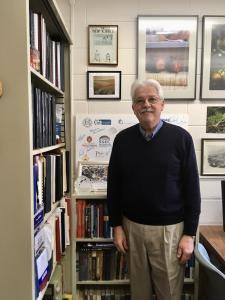W. Paul Menzel

NOAA Heritage Oral History Project
NOAA Heritage Oral History Project aims to document the history and legacy of NOAA through compelling interviews with its leaders. These firsthand accounts provide an invaluable resource that preserves NOAA's significant contributions to environmental research and management, fostering a deeper understanding of NOAA's vital role in shaping our understanding of the Earth's oceans and atmosphere.
Molly Graham
Dr. W. Paul Menzel grew up in Maryland and attended the University of Maryland-College Park. He attended The University of Wisconsin - Madison for his master's and PhD in Theoretical Solid State Physics. Since 1967, Paul has worked as a scientist for the Space Science and Engineering Center in Madison. He also started working as a adjunct professor in 1986 at UW, teaching undergraduate and graduate courses in physics and satellite meteorology. In 1999, Dr. Menzel became the Chief Scientist for the Center for Satellite Applications and Research in NOAA/NESDIS.
Scope and Content Note
Paul Menzel, a scientist, discusses his background and career in satellite remote sensing and meteorology. Dr. Menzel talks about his time in graduate school studying physics in Madison, Wisconsin where he experienced Vietnam War protests, including the Dow Chemical riots, and the Sterling Hall bombing in 1970. The interviewee briefly discusses their involvement as a teaching assistant during the student movements and protests on campus, including the Dow Chemical riots. He describes that, despite the unrest, he completed his degree and began teaching while also doing a post-doctoral fellowship. He explains that his career in satellite remote sensing started when he joined the team working on the first geostationary sounding instrument, the Visible Infrared Spin-Scan Radiometer (VISSR) Atmospheric Sounder, at the University of Wisconsin. In addition to his work with VISSR, Menzel discusses his collaboration with Bill Smith, a pioneer in satellite remote sensing, on the High-Resolution Infrared Sounder (HIRS) instrument. Regarding the relationship between NOAA and the University of Wisconsin-Madison, Dr. Menzel explains that it started with Verner Suomi's collaboration with both NASA and NOAA and led to the creation of the Cooperative Institute for Meteorological Satellite Studies, which formalized NOAA's engagement with the university.
Dr. Menzel highlights his contributions to the development and utilization of satellite remote sensing instruments, as well as his commitment to international collaboration in meteorology and weather forecasting. He also discusses the World Meteorological Organization (WMO) and its efforts to evolve the Global Observing System, his time on the Advanced Satellite Products Team, and working with the MODIS (Moderate Resolution Imaging Spectroradiometer) Science Team. Dr. Menzel goes on to mention his textbook, "Remote Sensing Applications with Meteorological Satellites".
Please Note: The oral histories in this collection are protected by copyright and have been created for educational, research and personal use as described by the Fair Use Doctrine in the U.S. Copyright law. Please reach out Voices@noaa.gov to let us know how these interviews are being used in your research, project, exhibit, etc. The Voices staff can help provide other useful resources related to your inquiry.
The NOAA mission is to understand and predict changes in climate, weather, oceans, and coasts, to share that knowledge and information with others, and to conserve and manage coastal and marine ecosystems and resources. The Voices Oral History Archives offers public access to a wide range of accounts, including historical materials that are products of their particular times, and may contain offensive language or negative stereotypes.
Voices Oral History Archives does not verify the accuracy of materials submitted to us. The opinions expressed in the interviews are those of the interviewee only. The interviews here have been made available to the public only after the interviewer has confirmed that they have obtained consent.
